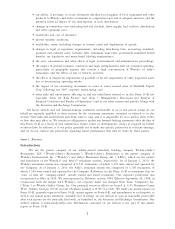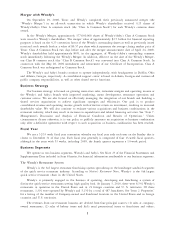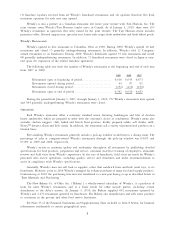Wendy's 2009 Annual Report Download - page 19
Download and view the complete annual report
Please find page 19 of the 2009 Wendy's annual report below. You can navigate through the pages in the report by either clicking on the pages listed below, or by using the keyword search tool below to find specific information within the annual report.sales as dues to AFA. As of April 1, 2010 and for the remainder of 2010, the AFA Board has approved a dues
increase based on a tiered rate structure for the payment of the advertising and marketing service fee ranging
between 1.4% and 3.6% of sales. ARG’s advertising and marketing service fee percentage similarly calculated
will be approximately 2.4% as of April 1, 2010. In addition, ARG has agreed to partially subsidize the top
two rate tiers in 2010 thereby decreasing franchisees’ effective advertising and marketing service fee
percentages. It is estimated that this subsidy will require payments by ARG of approximately $4.2 million to
AFA for 2010. Domestic franchisee participants in the SMI program pay an extra 1% premium on the
advertising and marketing service fee (2.2% total through March 31, 2010 and based on the tiered rate
structure, an extra 1.0% on the advertising and marketing service fee through December 31, 2010) of sales up
to a maximum of 3% as AFA dues for the first 36 months of operation; their AFA dues then revert to the
standard advertising and marketing service fee rate without the 1% premium.
Effective October 2005, ARG and the AFA entered into a management agreement (the “Management
Agreement”) that ARG believes has enabled a closer working relationship between ARG and the AFA, allowed
for improved collaboration on strategic marketing decisions and created certain operational efficiencies, thus
benefiting the Arby’s system as a whole. Pursuant to the Management Agreement, ARG assumed general
responsibility for the day-to-day operations of the AFA, including preparing annual operating budgets,
developing the brand marketing strategy and plan, recommending advertising and media buying agencies, and
implementing all marketing/media plans. ARG performs these tasks subject to the approval of the AFA’s
Board of Directors. In addition to these responsibilities, ARG is obligated to pay for the general and
administrative costs of the AFA, other than the cost of an annual audit of the AFA and certain other expenses
specifically retained by the AFA. ARG provided AFA with general and administrative services in 2009, as
required under the Management Agreement. Under the Management Agreement, ARG is also required to
provide the AFA with appropriate office space at no cost to the AFA. The Management Agreement with the
AFA continues in effect until terminated by either party upon one year’s prior written notice. In addition, the
AFA may terminate the Management Agreement upon six months’ prior written notice if there is a change in
the identity of any two of the individuals holding the titles of Chief Executive Officer, Chief Operating Officer
or Chief Administrative Officer of ARG in any period of 36 months. See Note 22 of the Financial Statements
and Supplementary Data included in Item 8 herein, for further information on AFA.
In addition to their contributions to the AFA, ARG and Arby’s domestic franchisees are also required to
spend a reasonable amount, but not less than 3% of sales of their Arby’s restaurants, for local advertising;
however, with the new AFA tiered rate structure discussed above, any AFA dues paid above 1.2% will be
credited against the local advertising spend requirements. The amount of expenditures for local advertising is
divided between (i) individual local market advertising expenses and (ii) expenses of a cooperative area
advertising program. Contributions to the cooperative area advertising program, in which both company-
owned and franchisee-owned restaurants participate, are determined by the local cooperative participants and
are generally in the range of 3% to 5% of sales. Domestic franchisee participants in our SMI program are not,
however, required to make any expenditure for local advertising until their restaurants have been in operation
for 36 months.
General
Governmental Regulations
Various state laws and the Federal Trade Commission regulate Wendy’s and Arby’s franchising activities.
The Federal Trade Commission requires that franchisors make extensive disclosure to prospective franchisees
before the execution of a franchise agreement. Several states require registration and disclosure in connection
with franchise offers and sales and have “franchise relationship laws” that limit the ability of franchisors to
terminate franchise agreements or to withhold consent to the renewal or transfer of these agreements. In
addition, Wendy’s and Arby’s and their respective franchisees must comply with the federal Fair Labor
Standards Act and the Americans with Disabilities Act (the “ADA”), which requires that all public
accommodations and commercial facilities meet federal requirements related to access and use by disabled
persons, and various state and local laws governing matters that include, for example, the handling, preparation
and sale of food and beverages, the provision of nutritional information on menu boards, minimum wages,
overtime and other working and safety conditions. Compliance with the ADA requirements could require
removal of access barriers and non-compliance could result in imposition of fines by the U.S. government or an
award of damages to private litigants. As described more fully under “Item 3. Legal Proceedings,” one of
12
























